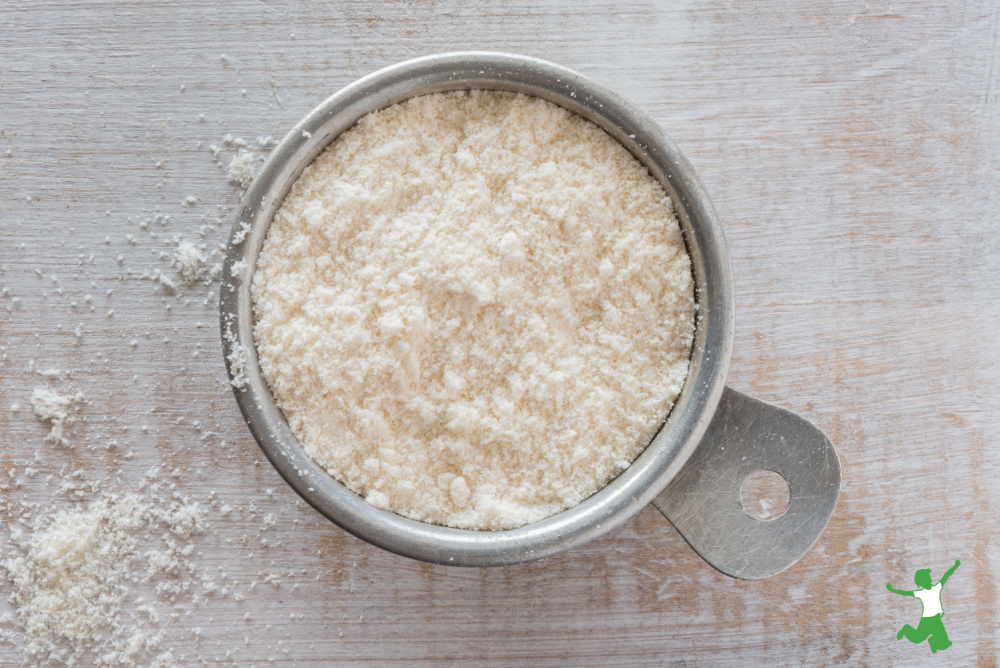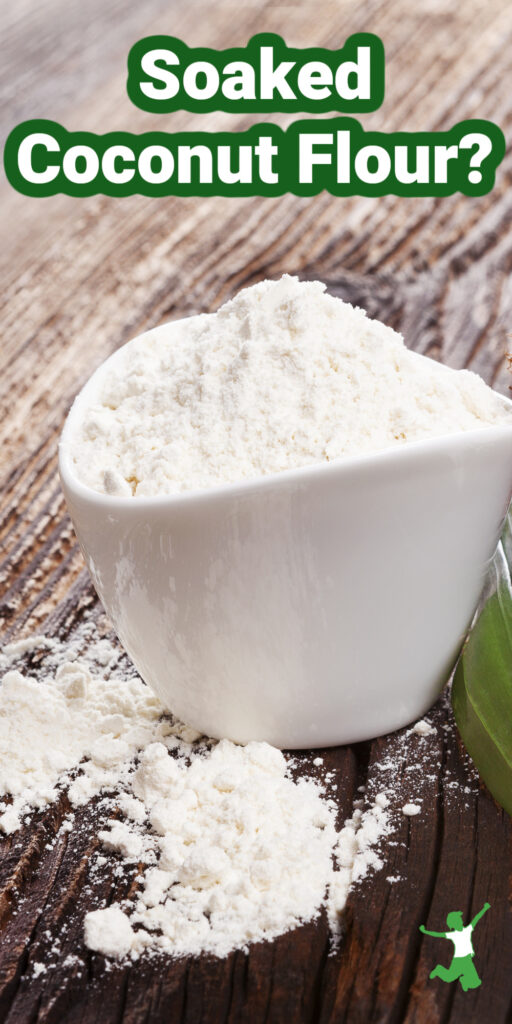Table of Contents[Hide][Show]
Examination of whether soaking coconut flour, one of the most popular baking ingredients for keto or low-carb eaters, is a necessary or beneficial practice to improve digestibility and nutrient absorption.

Baking with coconut flour is a popular low-carb alternative to grain flour.
In fact, it is one of the most popular flours for those espousing a keto dietary protocol.
Coconut flour is disaccharide-free and, as such, an acceptable flour for baking when one is following the GAPS or SCD diets too.
In addition, coconut flour is Paleo/Primal friendly for those who avoid grains as something that was not originally part of the human diet during pre-agricultural times.
An important question for those who include coconut flour on the menu is whether it should be soaked overnight, a hugely beneficial practice for grain flours such as wheat, spelt, einkorn, and rye.
Even gluten-free flours like rice and pseudo-grains like teff and quinoa are recommended for soaking overnight in an acidic medium such as buttermilk or yogurt.
Soaking flour helps to break down antinutrients and greatly improves digestibility and nutrient absorption. Sprouting helps as well.
Coconut: Neither Grain Nor Nut
Coconut flour is derived from the coconut plant, which is not a grain.
Despite its name, it is not a nut either. This can be confusing at first because soaking raw nuts is an important traditional practice as well.
Technically speaking, the coconut is a drupe, a distant cousin of tree nuts.
This means that it is a fruit with an outer fleshy part that surrounds a hard pit or seed in the center. (1)
Besides the coconut, other familiar examples of drupes include mangoes, apricots, olives, and pistachios.
Soaked Coconut Flour and Phytic Acid
In the article Living with Phytic Acid, author Rami Nagel addresses the issue of phytic acid in coconut flour.
Phytic acid is the most well-known antinutrient in grains, nuts, seeds, beans, and other legumes that is reduced by soaking.
In this article, Mr. Nagel states:
We do not have enough information about the preparation of coconut flour to say whether soaking reduces phytic acid, but as with other phytic-acid containing foods, the likelihood is that it is at least partially reduced. (2)
In addition, coconut itself is not a high phytate-containing food. For example, 100 grams of coconut contain approximately 230 mg of phytate.
This compares with 1800 mg/100 g of phytate in cashews, 1300 mg/100 g of phytate in almonds, and 1000 mg/100 g of phytate in dried lima beans.
Secondary products made from almonds such as almond flour and almond meal are also very high in phytates as well as oxalic acid. (3)
Based on the fact that no research is indicative of the benefits of soaked coconut flour and that it is a low phytate-containing drupe, I do not soak my coconut flour prior to baking.
When to Soak Coconut Flour
However, if a person is on the GAPS or SCD diet and eating coconut-containing foods several times a week, it might be wise to use soaked coconut flour since it is a regular feature on the menu.
The goal with regard to phytic acid is not to completely eliminate it from the diet but rather to keep it at manageable and acceptable levels.
Soaking those foods that are naturally high in phytates such as seeds, nuts, legumes, and grains and only soaking other foods that are eaten frequently but are low in phytates by comparison such as coconut flour seems a reasonable approach to meeting this overall dietary goal.
Recipes Using Coconut Flour
If you’ve never baked with coconut flour, here are some of my favorites using this popular keto ingredient.

(1) Coconut Plant
(2) Living with Phytic Acid
(3) Phytic Acid in Food








I buy raw, organic almond butter. After reading this article, I’m now wondering if this product would have too much Phytic Acid. Just because a product is organic and raw, I guess that doesn’t mean it’s 100% healthy. Does anyone know if there is almond butter available where they used properly soaked almonds?
Your hunch is right on. Raw, organic almond butter is loaded with antinutrients and best not consumed. Here’s where I get sprouted/soaked almond butter. https://www.thehealthyhomeeconomist.com/go/nuts-and-nut-butters
I have fermented to a now bubbling soury yougurt is soup, from rehydrated coconut flour. I have not introduced any culture. She is doing it herown self. It is not one day old.
It will get worse. How bad is it now ? I should chill it.
just starting AIP..i have ibs..adrenal fatigue…hypothyroidism…and was wondering if coconut flour is a FODMAP…i seem to get ibs spasms and bloat majorly when i consume alot of it..but i dont know if there is a safe limit to consume per day? (similar to xylitol)? shouldi avoid completely? reintroduce later? thanks!
I’ve been looking for the answer to this for months. For some reason I missed it here on your blog. Thank you so much for addressing it! I don’t do well on grains (at the moment, who knows could change) so I use coconut flour as a replacement. Also, thank you so much for providing all this wonderful info related to WAPF and a whole foods/traditional diet. You are awesome!
There’s an addendum worth reading about coconut and phytic acid by Bruce Fife at the end of this article on phytic acid.
http://www.westonaprice.org/food-features/living-with-phytic-acid
Hi Sarah, Thanks so much for addressing this. It is so difficult to find this type of info on coconut flour. I’m also glad the fiber issue was brought up. I love to make cookies from coconut flour but do find I’m left with an incredibly heavy feeling in my gut when I eat as many as I want (which is a lot, I admit). Coupled with the thirstiness I feel while eating them, I get the sense that the huge amount of fiber in coconut flour can be too much. Not that it is “bad fiber” but just that it is too much.
I’ve taken to splitting my recipes into half coconut flour and half almond flour. But I usually cheat and use premade almond meal/flour, rather than grinding crispy nuts. So I wonder whether I should be presoaking it. (Although I have found almond flour from Love Raw Foods/Blue Mountain Organics that is presoaked and dehydrated at a low temperature, as well as being made from TRULY RAW [not irradiated or steam-pasteurized] almonds and produced locally to me!! Yay!!)
I have also noticed that most coconut flour has the fat blasted from it by super-heated steam. This does not seem like a healthy process to me. I’m glad I have found some raw coconut flours that do not do this.
Just making comments here, out of curiosity whether you or others may have additional input. Thanks for your wonderful blog! I know that many of my friends have started following you and many great conversations have ensued!
My understanding from what I read was that all fiber was hard on digestion although grains are the worse. I thought he believed fiber was so bad in any form that he recommends taking supplements and completely eliminating all fiber. I don't agree with taking supplements but I do make broths with veggies and meat bones to get nutrients as well as eating pastured meats and fermented veggies. I also make fermented drinks.
BTW – since elimimating most fiber (absolutely no grains and limimted fruits and veggies), we have no constipation or diarrhea and healthy stools (ie small in diameter, low smell, formed but not hard and easily passed.) Sorry 'bout too much info:) We also eat lots of healthy fats to "lubricate" the digestive tract and help things run smoothly.